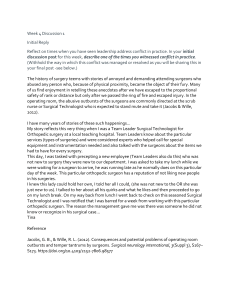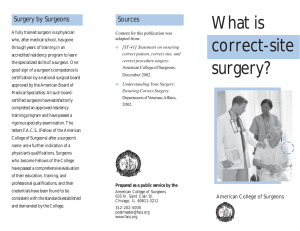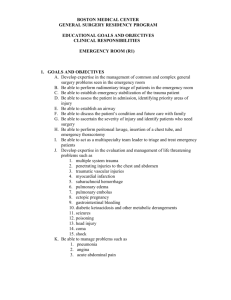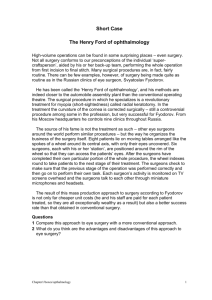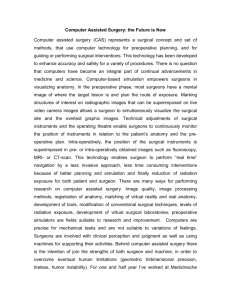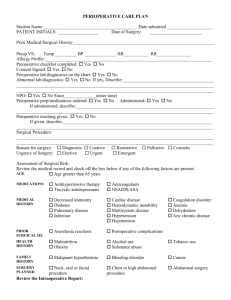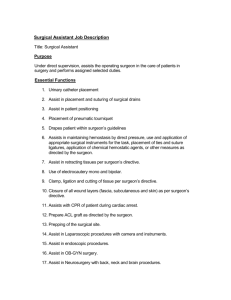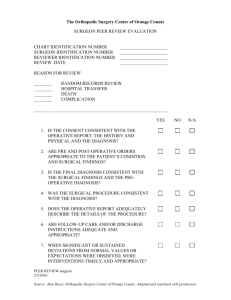December 15, 2010
advertisement
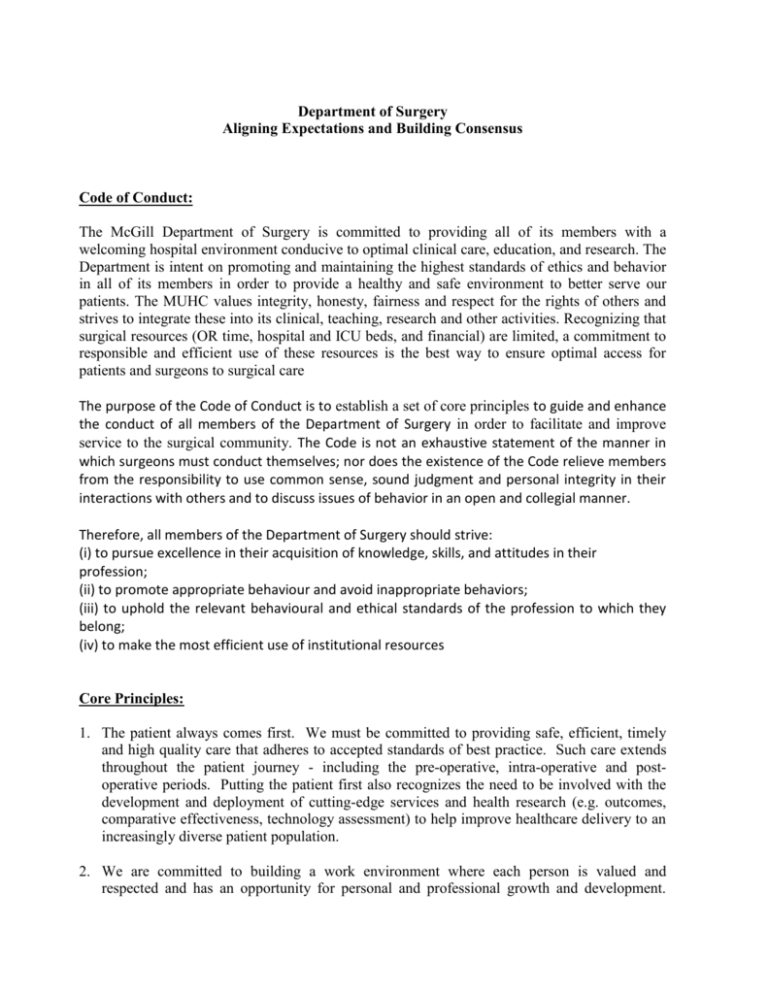
Department of Surgery Aligning Expectations and Building Consensus Code of Conduct: The McGill Department of Surgery is committed to providing all of its members with a welcoming hospital environment conducive to optimal clinical care, education, and research. The Department is intent on promoting and maintaining the highest standards of ethics and behavior in all of its members in order to provide a healthy and safe environment to better serve our patients. The MUHC values integrity, honesty, fairness and respect for the rights of others and strives to integrate these into its clinical, teaching, research and other activities. Recognizing that surgical resources (OR time, hospital and ICU beds, and financial) are limited, a commitment to responsible and efficient use of these resources is the best way to ensure optimal access for patients and surgeons to surgical care The purpose of the Code of Conduct is to establish a set of core principles to guide and enhance the conduct of all members of the Department of Surgery in order to facilitate and improve service to the surgical community. The Code is not an exhaustive statement of the manner in which surgeons must conduct themselves; nor does the existence of the Code relieve members from the responsibility to use common sense, sound judgment and personal integrity in their interactions with others and to discuss issues of behavior in an open and collegial manner. Therefore, all members of the Department of Surgery should strive: (i) to pursue excellence in their acquisition of knowledge, skills, and attitudes in their profession; (ii) to promote appropriate behaviour and avoid inappropriate behaviors; (iii) to uphold the relevant behavioural and ethical standards of the profession to which they belong; (iv) to make the most efficient use of institutional resources Core Principles: 1. The patient always comes first. We must be committed to providing safe, efficient, timely and high quality care that adheres to accepted standards of best practice. Such care extends throughout the patient journey - including the pre-operative, intra-operative and postoperative periods. Putting the patient first also recognizes the need to be involved with the development and deployment of cutting-edge services and health research (e.g. outcomes, comparative effectiveness, technology assessment) to help improve healthcare delivery to an increasingly diverse patient population. 2. We are committed to building a work environment where each person is valued and respected and has an opportunity for personal and professional growth and development. Integrity, Mutual Respect, Trust, Open Communication, Cooperation and Teamwork are valued. 3. Operating Room time belongs to the Department of Surgery and not to an individual service or to individual surgeons. Optimization of operating room utilization and effective and efficient use of all resources are top priorities for the Department. 4. The allocation of operating room time will be guided by the CAPS strategic plan and the need to deliver timely care to those patients based on the priorities of the institution. Surgeons will be expected to use this time in an efficient and responsible fashion. Code of Behaviour: 1. ALL consent forms (with the exception of emergency cases) must be signed prior to the patient being brought to the operating room. The consent should accompany the preoperative patient dossier. Informed consent must be provided by the surgeon and the patient must not be asked to sign a consent form that does not clearly indicate the operation(s) to be performed. 2. ALL surgeons are expected to have seen their first patient of the day no later than 7:30 a.m. Thereafter, the staff surgeon must be available in a timely fashion for all subsequent cases. The OR staff cannot spend time looking for a surgeon who should be in the OR to begin his/her next case. 3. ALL surgeons (or acceptable replacement according to the Surpass guidelines) must be in the OR to participate in the Time-Out/ Surpass. A case WILL NOT be permitted to proceed unless the Surpass has been completed. Compliance will be monitored. 4. It is incumbent upon the surgeon to work in partnership with the Preoperative Clinic to make sure that his/her patient understands the importance of following ALL pre-op instructions, and has received all necessary, required and appropriate pre-operative preparations (including, where relevant – showers, antibiotics, catheters, etc.) and/or instruction booklet prior to the patient being brought to the OR. 5. It is expected that the surgical attending or senior resident (or Fellow) will participate in the closure of the operative wound to facilitate the timely turnover of patients. The surgical attending must be in the operating room during all critical parts of the procedure. 6. At all times, proper behaviour and decorum must be maintained in the operating room. A zero tolerance policy will be enforced for verbal abuse and any other forms of harassment, as defined by the hospital’s policy of zero-tolerance for harassment. If such a situation arises, it is everybody’s responsibility to resolve the incident and if necessary an incident report is to be filed. 2 7. All scheduled surgical cases must be booked no later than 2 weeks prior to the planned operative intervention. These cases may be exchanged, based on the allocation of OR time and resources, up to 48 hours prior to surgery. The only permitted exceptions are trauma, cancer, flex and cardiac surgery cases. 8. It is the responsibility of the attending surgeon to ensure that the operative report is dictated within 24 hours of the operation. 9. The patient and/or family must be advised preoperatively of the expected length of stay. This may be included in the preoperative pamphlet. 10. Surgeons are encouraged to implement and follow clinical care pathways. 11. All patients admitted to the hospital must have a projected day of discharge written in the postoperative orders. 12. Patients must be seen at least once in the first 24-48 hours postoperatively, and preferably on a daily basis by their staff surgeon (or an alternate attending staff). A daily notation must be made in the patient’s chart to document (1) the patient’s condition (stable or otherwise) AND (2) anticipated date of discharge, or clinical milestones to be met in order for patient to be discharged. 13. The anticipated discharge date must be communicated to the unit manger (or delegate) at least the evening before it is to occur, recognizing that circumstances may delay or alter that plan. 14. All confirmed discharges must be communicated to the Unit Manager by 9:00 AM. Patient must leave their bed by 11 am. 15. Patient discharge should not be delayed for last minute tests or imaging. This should be planned at least 1 day in advance. The Patient Flow Coordinator should be contacted to help facilitate this. 16. The follow-up plans for the patient must be indicated in the patient’s chart and/or conveyed to the patient prior to discharge. Regular audits will be carried out to document compliance of these rules. Compliance will be taken into consideration when future resources are allocated. 3
